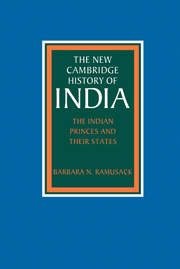Crossref Citations
This Book has been
cited by the following publications. This list is generated based on data provided by Crossref.
Sramek, Joseph
2006.
?Face Him Like a Briton?: Tiger Hunting, Imperialism, and British Masculinity in Colonial India, 1800-1875.
Victorian Studies,
Vol. 48,
Issue. 4,
p.
659.
Groenhout, Fiona
2006.
The History of the Indian Princely States: Bringing the Puppets Back onto Centre Stage.
History Compass,
Vol. 4,
Issue. 4,
p.
629.
Mcleod, John
2007.
‘A Numerous, Illiterate, and Irresponsible Bhayat’: The Maharaos of Kutch, their Nobles and the British Paramount Power, 1816–1947.
The Journal of Imperial and Commonwealth History,
Vol. 35,
Issue. 3,
p.
371.
Belli, Melia
2007.
In Memory of Gods and Kings: Power, Politics and the Role of the Past in Royal Kachhawaha Cenotaphs.
South Asian Studies,
Vol. 23,
Issue. 1,
p.
127.
Ikegame, Aya
2009.
Space of kinship, space of empire.
The Indian Economic & Social History Review,
Vol. 46,
Issue. 3,
p.
343.
Jhala, Angma
2010.
The Jodhpur regency: princely education, politics and gender in post-colonial India.
South Asian History and Culture,
Vol. 1,
Issue. 3,
p.
378.
Hussain, Shafqat
2010.
Sports-hunting, Fairness and Colonial Identity: Collaboration and Subversion in the Northwestern Frontier Region of the British Indian Empire.
Conservation and Society,
Vol. 8,
Issue. 2,
p.
112.
Ho, Engseng
2013.
FOREIGNERS AND MEDIATORS IN THE CONSTITUTION OF MALAY SOVEREIGNTY.
Indonesia and the Malay World,
Vol. 41,
Issue. 120,
p.
146.
Ponsford, Megan
2015.
Breaking down racial barriers? The Maharaja of Patiala’s 1935 Australian cricket tour of India.
Identities,
Vol. 22,
Issue. 2,
p.
199.
Datla, Kavita Saraswathi
2015.
The Origins of Indirect Rule in India: Hyderabad and the British Imperial Order.
Law and History Review,
Vol. 33,
Issue. 2,
p.
321.
Stevens, John
2016.
Marriage, duty and civilization: Keshab Chandra Sen and the Cuch Bihar controversy in metropolitan and colonial context.
South Asian History and Culture,
Vol. 7,
Issue. 4,
p.
401.
Manjrekar, Nandini
2017.
Second International Handbook of Urban Education.
p.
369.
Lanzillo, Amanda
2018.
Printing princely modernity: Lithographic design in Muslim-ruled princely states.
South Asian Popular Culture,
Vol. 16,
Issue. 2-3,
p.
245.
2018.
India, Empire, and First World War Culture.
p.
39.
Washbrook, David
2019.
Forms of citizenship in pre-modern South India.
Citizenship Studies,
Vol. 23,
Issue. 3,
p.
224.
Khoja-Moolji, Shenila
2019.
Re-animating Muslim women’s auto/biographical writings:
Hayat-e-Ashraf
as a palimpsest of educated selves
.
Third World Thematics: A TWQ Journal,
Vol. 4,
Issue. 4-5,
p.
345.
Condos, Mark
2020.
The Indian ‘Alsatia’: Sovereignty, Extradition, and the Limits of Franco-British Colonial Policing.
The Journal of Imperial and Commonwealth History,
Vol. 48,
Issue. 1,
p.
101.
Faheem, Farrukh
2020.
Doing research in a ‘conflict zone’: history writing and archival (im) possibilities in Jammu and Kashmir.
Identities,
Vol. 27,
Issue. 3,
p.
267.
Dincecco, Mark
Fenske, James
Menon, Anil
and
Mukherjee, Shivaji
2020.
Pre-Colonial Warfare and Long-Run Development in India.
SSRN Electronic Journal ,
Dincecco, Mark
Fenske, James
Menon, Anil
and
Mukherjee, Shivaji
2022.
Pre-Colonial Warfare and Long-Run Development in India.
The Economic Journal,
Vol. 132,
Issue. 643,
p.
981.



